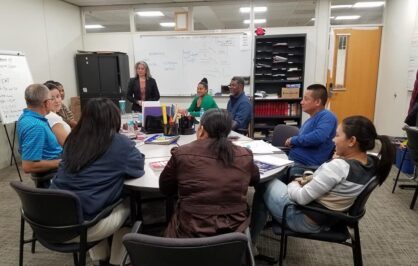
Grants & Scholarships
The Path Home
Exorbitant bills from an emergency hospital visit. An unexpected layoff. The skyrocketing costs of rent, prescriptions, childcare, groceries, and utilities. A mental health crisis that compounds into an eviction. There are many roads that lead to being unhoused.
At the end of last year, the Rhode Island Foundation awarded $160,000 in grants to help Rhode Islanders stay housed over the winter. The funding was awarded to eight nonprofits across the state that regularly work with people who are homeless or in danger of losing their homes due to relatively small expenses. Amos House, Community Care Alliance, House of Hope CDC, Lucy’s Hearth, Sojourner House, Thrive Behavioral Healthcare, Tri-County Community Action Program, and the WARM Center received the grant support to provide people with direct assistance for minor, unexpected, temporary, or one-time costs without which they might lose their housing.
Nearly all of the funding has been spent, and more is needed, as the housing crisis persists in every community in Rhode Island.
Lucy’s Hearth, a 24-hour emergency and transitional shelter in Newport County, spent $11,000 almost immediately, as did House of Hope CDC, a community development corporation aimed at preventing and ending homelessness.
Unrestricted is better because we can make it flexible for anything. Our clients need the support, and we are getting them what they need.
The need is now.
- Saribel Cruz, Director of Housing Stabilization at Sojourner House
“Everything that House of Hope does affirms that housing is a basic human right, and we start there,” said Laura Jaworski, its executive director. “Our work doesn’t always look like housing, meaning we’re not always taking a person and matching them to four walls. That’s the ultimate goal, but there are a whole lot of steps in between. Where the person is at and what they want to do drives the direction and pace of the work we do.”

The nonprofit, known for its street outreach team and Shower to Empower mobile truck, used the funding as “diversion dollars,” which Jaworski explained as money that assists individuals, so they do not need to enter the emergency shelter system. This assistance included help with things like past-due rent, security deposits, a bus ticket to a state where a job is waiting, or fixing a propane tank for an RV.
The grant funding was also used for expenses related to the cost of being homeless, financial burdens that are hard to overcome – such as storage fees, car repairs that are critical to keep going to work or awaiting money from a slow-processing federal agency - expenses most federal, state, or other grants cannot cover. The Foundation’s grant assistance was also unrestricted, meaning the nonprofits decided how best to use the funding.
“That’s why this money matters,” Jaworski said. “Unrestricted is the magic of this.”
Many of the nonprofits agreed unrestricted funding was the best aspect of these dollars.
For example, Sojourner House, which provides culturally sensitive support, advocacy, housing, and education for victims and survivors of domestic violence, sexual assault, and human trafficking, bought 40 copies of “How Not to Fail at Renting,” an interactive workbook that staff use to help their clients understand their rights, as well as the expectations and responsibilities associated with being a renter, and what to do if a situation arises in their unit. They also purchased grocery gift cards, gift cards for transportation to view potential housing, paid utility bill deposits, and spent more than $9,000 for landlord incentives.
“Unrestricted is better because we can make it flexible for anything,” said Saribel Cruz, its director of housing stabilization. “Our clients need the support, and we are getting them what they need. The need is now.”

In a Christmas plea for donations, Lucy’s Hearth Director Ashley Salemi Tarvis said, “Your support of $70 is a monthly bus pass for a parent to get to work; $250 feeds Lucy’s families for three days; $500 provides healthy snacks for kids for one month; $1,500 is children’s activities and educational support for one month; $3,500 keeps our shelter open for one day; and $5,000 will help a family get settled in their forever home.”
She continued, “Your contribution, no matter the size, can change the trajectory of a child’s life. You can help them find a place to call home.”
When interviewed, she said the $20,000 received from the Foundation was welcomed and needed. One of the families that Lucy’s Hearth supported had multiple members with medical needs. They were paying an excess of their available cash to Uber for transportation due to a suspended license.
“It was a detriment to them,” Salemi Tarvis explained, “so we were able to pay that summons so they could get the license renewed and get to their appointments, search for apartments, and do all the things they needed to. It was such a weight off their back.”
Lucy’s Hearth also paid to seal the eviction of a single, immigrant dad, establishing a clean housing record and making way for a new opportunity to find a home. They assisted a family with three young children to pay past-due rent.
The nonprofit chose to help with, as the director explained, matters that are “barriers to earning potential or housing.”
The same, or a similar approach, was used by Thrive Behavioral Health, and Amos House, which since 1976, has been a staple nonprofit serving the homeless, unemployed, and those who are living in poverty with meals, job training, social services, and business opportunities.
Thrive spent all the grant funding on housing and rent assistance (such as security deposits, landlord mitigation, and money to stay in sober living) for ten individuals from three of its programs – community support, housing first, and Kent County Housing, As a result of the Path Home program, they were also able to convince one man who had been evading their help for months to get the assistance he desperately needed.

Amos House also used much of its funding on rental services, such as first month’s rent and security deposits. Jennifer Kodis, who oversees its LISC Financial Opportunity Center, said they were able to help an unhoused man who had been living in its shelter, first with car repairs, and then by providing a short-term hotel stay so he could locate more permanent housing while still maintaining a third-shift job, as well as assist a woman in keeping her items secure in storage for two months as she too searched for a place to call home.
Community Care Alliance provides a comprehensive array of services, predominantly in Northern Rhode Island, including basic needs assistance, support services, and residential programs for individuals and families challenged by mental health and addiction; as well as harm reduction drop-in and outreach, and emergency and supportive housing to prevent homelessness and promote stabilization. The organization utilized the $20,000 grant in the same manner as their client emergency fund. That fund, according to Wendy Pires, fundraising and public relations manager, “covers a need where there is no other resource.”
Pires listed housing assistance, documentation fees, car repairs, hotel stays, utility assistance, and help with other challenging situations that, once taken care of, allow a person or family to “focus on all the other parts of their life and get a step up.” In most cases, Community Care Alliance ensures sustainability while offering assistance.
“A lot of times, we bring the case management team in to figure out in what other ways we can help this family so they are truly stabilized,” she said. “We really wrap around them, working with them to figure out the next steps so the situation doesn’t happen again.”



